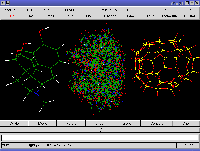
A molecule (morphine), a protein fragment (about 4,000 atoms)
and a zeolite unit, all drawn in wired mode. Oxygens are
red, Nitrogens are blue, Carbons are green and Hydrogens
are white. Image taken on GNU/Linux Red Hat 5.2, running
AnotherLevel with the AfterStep window manager.
Size: 22,669 bytes.
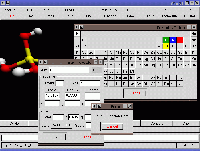
The silica monomer, Si(OH)4, in solide mode, with
a diffuse light, in a window showing also the dialog
to create atoms, the Periodic Table of the elements
and a typical error dialog. Silicons are yellow,
Oxygens are red, and Hydrogens are white. Image taken
on GNU/Linux Red Hat 5.2, running AnotherLevel with
the AfterStep window manager.
Size: 54,649 bytes.
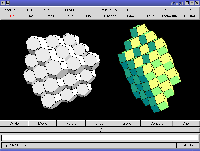
3x3x3 Wigner-Seitz cells for a CCC lattice, on the left,
and 3x3x3 Wigner-Seitz cells for a CFC lattice, on the right,
the first ones in a layer with a grey light, and the second
ones in a different layer, with a yellow-green light.
Image taken on GNU/Linux Red Hat 5.2, running
AnotherLevel with the AfterStep window manager.
Size: 17,841 bytes.
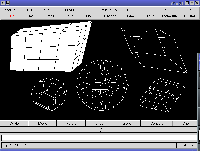
A bunch of lattices, mostly drawn in wired mode.
Above: a solid 4x3x2 triclinic lattice cell on the left,
a triclinic lattice filtered by a second triclinic
rhombus on the right. Below: a single CCC Wigner-Seitz
cell in wired mode, on the left, a cubic lattice filtered
by a sphere in the center and a 4x4x1 primitice CFC lattice
on the right (all in a layer with perspective projection).
Image taken on GNU/Linux Red Hat 5.2, running
AnotherLevel with the AfterStep window manager.
Size: 16,878 bytes.
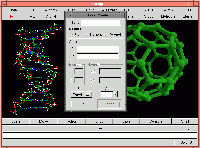
DNA on the left, in wired mode, and C60 on the right,
in solid mode, in a different layer, with a grey
light. The dialog to create bonds is also shown.
Silicons are yellow, Oxygens are red, Nitrogens are blue,
Carbons are green, Phosporous are grey and Hydrogens
are white. Image taken on GNU/Linux Red Hat 5.2, running
AnotherLevel with the Motif/Lesstif window manager.
Size: 41,660 bytes
 A molecule (morphine), a protein fragment (about 4,000 atoms)
and a zeolite unit, all drawn in wired mode. Oxygens are
red, Nitrogens are blue, Carbons are green and Hydrogens
are white. Image taken on GNU/Linux Red Hat 5.2, running
AnotherLevel with the AfterStep window manager.
Size: 22,669 bytes.
A molecule (morphine), a protein fragment (about 4,000 atoms)
and a zeolite unit, all drawn in wired mode. Oxygens are
red, Nitrogens are blue, Carbons are green and Hydrogens
are white. Image taken on GNU/Linux Red Hat 5.2, running
AnotherLevel with the AfterStep window manager.
Size: 22,669 bytes.
 The silica monomer, Si(OH)4, in solide mode, with
a diffuse light, in a window showing also the dialog
to create atoms, the Periodic Table of the elements
and a typical error dialog. Silicons are yellow,
Oxygens are red, and Hydrogens are white. Image taken
on GNU/Linux Red Hat 5.2, running AnotherLevel with
the AfterStep window manager.
Size: 54,649 bytes.
The silica monomer, Si(OH)4, in solide mode, with
a diffuse light, in a window showing also the dialog
to create atoms, the Periodic Table of the elements
and a typical error dialog. Silicons are yellow,
Oxygens are red, and Hydrogens are white. Image taken
on GNU/Linux Red Hat 5.2, running AnotherLevel with
the AfterStep window manager.
Size: 54,649 bytes.
 3x3x3 Wigner-Seitz cells for a CCC lattice, on the left,
and 3x3x3 Wigner-Seitz cells for a CFC lattice, on the right,
the first ones in a layer with a grey light, and the second
ones in a different layer, with a yellow-green light.
Image taken on GNU/Linux Red Hat 5.2, running
AnotherLevel with the AfterStep window manager.
Size: 17,841 bytes.
3x3x3 Wigner-Seitz cells for a CCC lattice, on the left,
and 3x3x3 Wigner-Seitz cells for a CFC lattice, on the right,
the first ones in a layer with a grey light, and the second
ones in a different layer, with a yellow-green light.
Image taken on GNU/Linux Red Hat 5.2, running
AnotherLevel with the AfterStep window manager.
Size: 17,841 bytes.
 A bunch of lattices, mostly drawn in wired mode.
Above: a solid 4x3x2 triclinic lattice cell on the left,
a triclinic lattice filtered by a second triclinic
rhombus on the right. Below: a single CCC Wigner-Seitz
cell in wired mode, on the left, a cubic lattice filtered
by a sphere in the center and a 4x4x1 primitice CFC lattice
on the right (all in a layer with perspective projection).
Image taken on GNU/Linux Red Hat 5.2, running
AnotherLevel with the AfterStep window manager.
Size: 16,878 bytes.
A bunch of lattices, mostly drawn in wired mode.
Above: a solid 4x3x2 triclinic lattice cell on the left,
a triclinic lattice filtered by a second triclinic
rhombus on the right. Below: a single CCC Wigner-Seitz
cell in wired mode, on the left, a cubic lattice filtered
by a sphere in the center and a 4x4x1 primitice CFC lattice
on the right (all in a layer with perspective projection).
Image taken on GNU/Linux Red Hat 5.2, running
AnotherLevel with the AfterStep window manager.
Size: 16,878 bytes.
 DNA on the left, in wired mode, and C60 on the right,
in solid mode, in a different layer, with a grey
light. The dialog to create bonds is also shown.
Silicons are yellow, Oxygens are red, Nitrogens are blue,
Carbons are green, Phosporous are grey and Hydrogens
are white. Image taken on GNU/Linux Red Hat 5.2, running
AnotherLevel with the Motif/Lesstif window manager.
Size: 41,660 bytes
DNA on the left, in wired mode, and C60 on the right,
in solid mode, in a different layer, with a grey
light. The dialog to create bonds is also shown.
Silicons are yellow, Oxygens are red, Nitrogens are blue,
Carbons are green, Phosporous are grey and Hydrogens
are white. Image taken on GNU/Linux Red Hat 5.2, running
AnotherLevel with the Motif/Lesstif window manager.
Size: 41,660 bytes